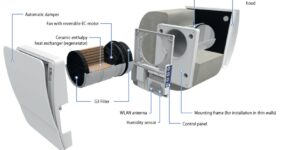How does Decentralised MVHR Improve Energy Efficiency
In the pursuit of energy efficiency, decentralised Mechanical Ventilation with Heat Recovery (MVHR) systems emerges as a game-changer. This article explores the transformative impact of decentralised MVHR on energy consumption and indoor air quality.
Understanding Decentralised MVHR
Decentralised MVHR, a decentralized Mechanical Ventilation System, operates on a room-by-room basis. Unlike centralized systems, it allows for precise control, maximizing efficiency and reducing energy wastage.
Energy Recovery Mechanism
One key feature is the heat recovery mechanism. By extracting heat from outgoing air and transferring it to incoming fresh air, decentralised MVHR ensures minimal heat loss, contributing significantly to energy savings.
Room-Specific Ventilation
Unlike centralized systems that ventilate the entire building uniformly, decentralised MVHR adapts ventilation rates to specific room requirements. This targeted approach optimizes energy use while providing tailored comfort.
Benefits of Decentralised MVHR
Energy Cost Reduction
Decentralised MVHR’s ability to recover and reuse heat leads to reduced heating costs. It maximizes energy efficiency by ensuring that the energy invested in heating the air is not wasted but recycled within the building.

Improved Indoor Air Quality
Precise control over ventilation in individual rooms means better air quality. Decentralised MVHR prevents the spread of pollutants, allergens, and odors, fostering a healthier indoor environment.
Enhanced Comfort and Control
Residents or building occupants gain individual control over their indoor climate. This promotes comfort customization and eliminates the need for unnecessary ventilation, further optimizing energy usage.
Implementing Decentralised MVHR
Installation Considerations
Prioritize professional installation to ensure optimal performance. Properly sized and strategically placed units guarantee efficient air circulation and heat recovery.
Regular Maintenance
Scheduled maintenance is vital to uphold system efficiency. Periodic filter replacement and cleaning are necessary to keep the decentralised MVHR system running smoothly.
Decentralised MVHR represents a leap forward in energy-efficient ventilation systems. Its targeted approach to heat recovery and ventilation not only reduces energy costs but also enhances indoor air quality. As we strive for sustainability, embracing decentralised MVHR is a step toward a greener and more efficient future.
decentralised mvhr
Decentralised MVHR (Mechanical Ventilation with Heat Recovery) is a cutting-edge solution revolutionizing how buildings manage indoor air quality and energy consumption. Unlike traditional centralized systems, decentralised MVHR operates on a room-by-room basis, offering precise control and energy efficiency. By recovering heat from outgoing air and redistributing it to incoming fresh air, these systems ensure minimal energy wastage. This innovative approach not only reduces heating costs but also promotes targeted ventilation, improving overall indoor air quality. Embracing decentralised MVHR is a key step towards sustainable and energy-efficient building management.

